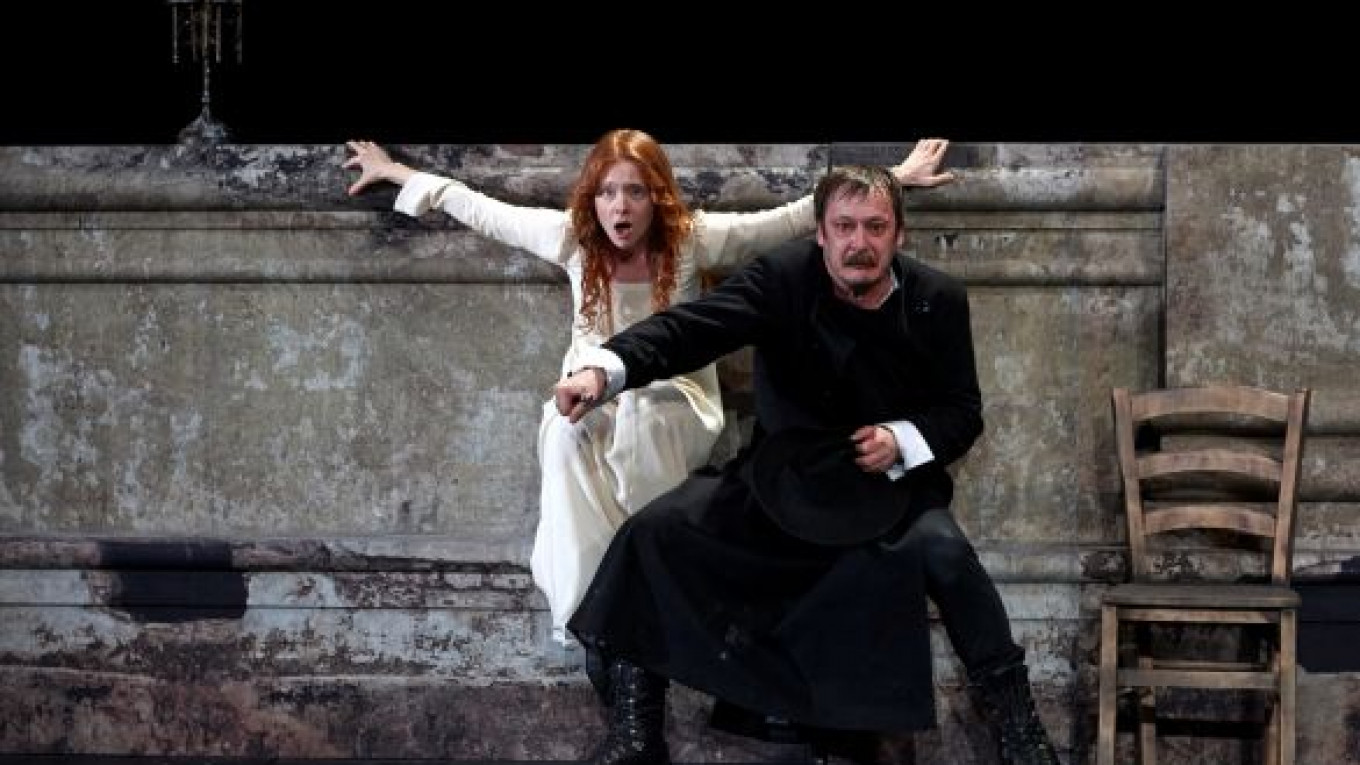Gabriella Tuminaite's production of Gotthold Ephraim Lessing's "Emilia Galotti" at the Sovremennik Theater is a fine example of a glass half-full/half-empty.
Stylish and bold, it bears the mark of a talented director making her Moscow debut, and boasts some interesting, eccentric work by actors. On the other hand, most of it seems to go right by spectators, as though it were an inside joke intended for someone else.
Tuminaite, the daughter of renowned director Rimas Tuminas, obviously has inherited an audacious point of view and a unique feel for the stage. Her production is attractive and dynamic. It strives to be funny, and occasionally, it is. Even her choice of material — a fairly obscure 18th-century drama about a prince scheming to steal a rival's fiancee — demonstrates her feel for the unconventional.
These are strengths in this show, more than enough for me to say I eagerly look forward to her future work. But I could not shake the sense throughout the performance that "Emilia Galotti" misfires on almost all cylinders.
The set by designer Adomas Jacovskis signals instantly that this is not any run-of-the-mill interpretation of a classic play. A low, faux cinderblock wall runs across the entire width of the small stage at the Sovremennik. It can double as a garden wall or an interior wall. A large mirror stands to one side and a small table and chair stand off stage center. An upright piano fits into a niche in the wall and looks out of place in an artistic kind of way. A sense of alienation blows through this space before anything has happened.
Then there is the appearance of the actors: cloaked in black, eyes and faces made up rather vampirishly, voices shrill and unnatural. Is this a parody? Is it grotesque run wild? The chortling, arrogant mode of speech overruns whatever other nuances may exist. It is the screaming baby in an airplane, the ambulance parked outside your bedroom window with the siren on. Do what you may, think what you might, it drowns out everything else.
By the first time an actor speaks in normal tones well into the performance, patience has long since run out.
Tuminaite clearly attempts to play with opposites. As the action kicks into gear Lana Del Rey's slinky, understated pop hit "Video Games" runs coolly in the background — "Heaven is a place on earth with you, tell me all the things you want to do … " It stands in stark contrast to the style Tuminaite has directed her actors to employ, but to what purpose?
The story is almost generic.
The Prince (Ilya Lykov) and his cackling chamberlain Marinelli (Yevgeny Pavlov) discuss the beauty of the young Emilia, pondering what might be done to wrest her from her betrothed, Count Appiani. Marinelli takes it to mean he should have Appiani (Shamil Khamatov) killed, after which he spirits Emilia (Darya Belousova) to the prince's quarters. Emilia's father (Vladislav Vetrov), distraught at what has happened, ends up impassively killing his daughter and entrusting whatever else may happen to fate.
You see why the play is seldom revived and you ask yourself, what is it that prompted Tuminaite to take it on?
It doesn't appear to be a satire, whether of so-called commoners or corrupt people in power — it is too heavily wrapped up in its own odd style of presentation.
If it is a parody, what is the target? Parody tends to work when the object of ridicule is clear and familiar. But this play will be virtually unknown to most spectators, while the only target I can see for the exaggerated, gothic acting would be Anatoly Vasilyev's former School of Dramatic Art. That, however, seems so unlikely as to be absurd.
I'm more tempted to wonder if this is a mismatch in cultural terms. Lithuanian theater — and Tuminaite is Lithuanian — tends to play boldly with sharp eccentricity. Russian theater, which continues to be primarily based in psychological realism, has difficulty with such approaches. Could it be that two methods crashed up against one another?
Whatever the case, a couple of performances catch the eye. Vetrov's bug-eyed father is particularly funny and on-target. Belousova is quite endearing as the caustic, energetic and petulant Emilia.
"Emilia Galotti" is a strange, uneven offering. If you can find your way past the hard shell of its style, there may be something of interest here. If not, you'll likely be left wondering what the fuss is about.
"Emilia Galotti" plays Feb. 8, 21 and 25 at 7:30 p.m. on the Drugaya Stsena at the , located at 19 Chistoprudny Bulvar. Metro Chistiye Prudy. Tel. 495-621-6473. Running time: 1 hour, 55 minutes.
Contact the author at [email protected]
Related articles:
A Message from The Moscow Times:
Dear readers,
We are facing unprecedented challenges. Russia's Prosecutor General's Office has designated The Moscow Times as an "undesirable" organization, criminalizing our work and putting our staff at risk of prosecution. This follows our earlier unjust labeling as a "foreign agent."
These actions are direct attempts to silence independent journalism in Russia. The authorities claim our work "discredits the decisions of the Russian leadership." We see things differently: we strive to provide accurate, unbiased reporting on Russia.
We, the journalists of The Moscow Times, refuse to be silenced. But to continue our work, we need your help.
Your support, no matter how small, makes a world of difference. If you can, please support us monthly starting from just $2. It's quick to set up, and every contribution makes a significant impact.
By supporting The Moscow Times, you're defending open, independent journalism in the face of repression. Thank you for standing with us.
Remind me later.







